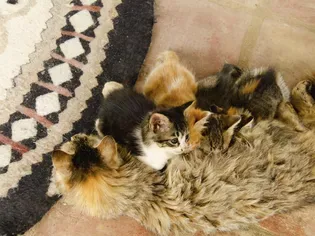How Soon Can a Cat Get Pregnant After Having Kittens?
Updated on 05/27/24

When Love Blooms Again: Understanding the Reproductive Cycle of Cats After Birth
Welcoming a litter of kittens into the world is an incredibly rewarding experience for cat owners. However, as the joy settles and life with newborns becomes the norm, it's natural to wonder when your beloved feline companion can experience the joys of motherhood once more. In this comprehensive guide, we'll delve into the intricate details of a cat's reproductive cycle after birth, providing you with all the information you need to make informed decisions about your pet's health and well-being.
Understanding the Postpartum Period
After giving birth, cats enter a period known as the postpartum period, during which their bodies undergo significant changes to recover from the demanding process of pregnancy and labor. This period typically lasts for several weeks and is characterized by:
* Lochia: A bloody or mucus-like discharge that gradually decreases in volume and frequency over time.
* Uterine Contractions: These contractions help the uterus return to its normal size and expel any remaining placental material or fetal membranes.
* Hormonal Fluctuations: The levels of hormones, such as progesterone, that were high during pregnancy decrease rapidly after birth, triggering changes in the reproductive system.
Return to Estrus (Heat)
Estrus, commonly known as "heat," refers to the period when a female cat is receptive to mating. The timing of a cat's first estrus after birth varies depending on several factors, including:
* Individual Variations: Some cats may experience estrus within a few weeks after giving birth, while others may take several months to return to heat.
* Nursing: Cats that are nursing may experience a delay in estrus due to hormonal changes associated with lactation.
* Litter Size: Cats with larger litters may experience delayed estrus compared to those with smaller litters.
Examples:
* A study published in the Journal of Feline Medicine and Surgery indicated that cats with litters of three or more kittens had a mean estrus interval of 65 days, while cats with litters of two or fewer kittens had a mean estrus interval of 45 days.
* A separate study conducted by the University of California, Davis, found that 50% of nursing cats experienced estrus within 6 weeks after giving birth, while the remaining 50% experienced estrus within 12 weeks after giving birth.
Fertility and Pregnancy Risks
While cats can technically become pregnant during their first estrus after giving birth, it's generally not recommended to breed them at this time. The body needs time to fully recover from the previous pregnancy and lactation, and breeding too soon can increase the risks of:
* Reproductive Problems: Uterine infections, uterine inertia, and other complications can occur if the uterus has not fully recovered.
* Health Concerns for the Kittens: Kittens born to mothers who were bred too soon may have low birth weights, developmental issues, or be more susceptible to diseases.
Recommended Breeding Interval
Veterinarians typically recommend waiting at least two estrus cycles or approximately 6-8 months after giving birth before breeding a cat again. This allows ample time for the body to fully recover and ensures that the cat is in optimal health for a successful pregnancy and healthy kittens.
Conclusion
The timing of a cat's first estrus after birth can vary significantly, influenced by factors such as individual differences, nursing status, and litter size. While cats may technically become pregnant during their first estrus, it's essential to prioritize their well-being by waiting an appropriate interval before breeding them again. By following veterinarian recommendations and monitoring your cat's reproductive cycle closely, you can help ensure their health and the well-being of future litters.
Explore More Pets

Cat Behavior Problems
How to Stop Aggression in Kittens

Long-Haired Cat Breeds
Siberian Cat: Breed Profile, Characteristics, & Care

Cat Behavior Problems
How to Stop Kittens From Scratching and Biting

Long-Haired Cat Breeds
Turkish Angora: Cat Breed Profile, Characteristics & Care

Basic Training
How to Socialize Your Kitten

Short-Haired Cat Breeds
Cute Pictures & Facts About Calico Cats & Kittens

Litter Box Training
Training Your Kitten to Use the Litter Box

Long-Haired Cat Breeds
10 Fun Facts About White Cats
